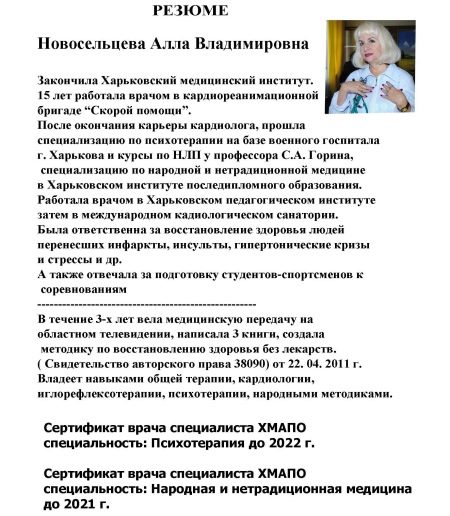How to write a doctor's resume?

Physician is one of the most difficult and respected professions. A good specialist in his field will always be in demand. Moreover, even for such highly qualified professionals, there are certain rules when hiring.
How can a doctor write his resume correctly? Do I need to write a cover letter and how to do it right? What blocks must be included in the resume? In our article, we will answer these and some other questions in detail.
Compilation rules
To get a job in a hospital, you need to correctly draw up a doctor's resume. This document will help you stand out among the huge number of job seekers applying for the job, and will also create the first impression of you in the eyes of the employer.
First of all, it should be noted that CV writing should be approached with great responsibility and attention (and regardless of whether you want to work in a small provincial clinic or in a highly specialized clinic in the capital).
So, first you should carefully read the immediate job description... In many cases, the employer initially describes all the requirements that a specialist must meet in order to enter a particular position. If you have all the necessary qualities, then you can feel free to submit your resume.
At the first stage it is important to carefully study the direct employer... Find out if the clinic has a specific specialization, how many patients are served in the organization and who works as the head physician. If possible, talk to the clinic staff.All these actions will give you a general understanding of whether you yourself want to work in this institution, as well as what requirements are put forward for those who already work, what atmosphere prevails in the team, etc.
After such preparatory work, you can proceed to the direct preparation of the document.

The tone of the resume should be purely businesslike. Even if you are applying for leadership positions (for example, for the position of chief physician), you should not boast too much about your achievements. Be humble, describe your education and work experience, but don't be overly brash.
Particular attention should be paid not only to the content of the resume, but also to the very design of the document. It is important to maintain a general business style, use a neutral font, and do not use bright colors and shades.
An important part of the resume of any doctor (regardless of the specific specialization) is the photo... The thing is that a doctor spends most of his working time communicating with patients. And since the work of a medical officer is associated with great risks, it is very important that the person of the doctor inspires confidence and commands respect both from the patients themselves and from their relatives. It is recommended to attach a photo to the resume in a robe at the desk. Don't be too serious, there may be light smile.
Remember that your job is very much about communicating with people.

When writing a resume it is important to note the fact that you meet all the employer's requirements specified in the vacancy itself. So, for example, if an applicant is required to have experience working in a laboratory, then it is very important to talk about in which laboratory and for how long you worked, what exactly did you do. Thus, you will make it clear to the employer that you value his time and approach with all seriousness any business you undertake (even if it is writing a resume).
Very often in resume templates you can find such a column as "Additional Information". Most often it is intended to describe those facts that did not have a place in all the previous chapters. So, for example, if your place of residence and prospective place of work are located at different ends of the city, it will be useful to indicate information that you own your own vehicle and the rights to drive it.
If you do not know what to write in this section, then you can simply delete it, it is by no means obligatory.
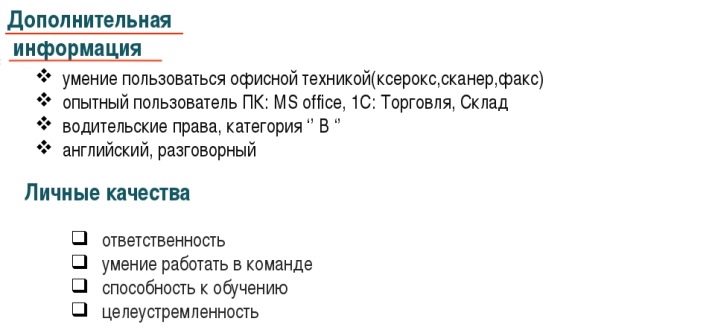
Transmittal letter
Not every employer requires job seekers to write a cover letter. Due to this such a document should be considered additional rather than basic... At the same time, if such a requirement is present, then its writing should be approached as seriously as the preparation of the resume itself.
The first thing to do is Think carefully about the sections that will go into your cover letter. So, you can write about your education, work experience, personal qualities or motivation - in this regard, all means are good. remember, that your primary task is to draw the employer's attention to your candidacy, since he deals with a large amount of documentationthat comes from dozens or even hundreds of job seekers.
When writing a cover letter, you should not go into details of your personal life or describe your biography in detail. It is important to note only those points that will be relevant at the new place of work. So, for example, you can talk about the fact that you have previously worked as a family doctor (if you are applying for a similar position) and that those families who were your clients have been treated with you for years or even generations, and also advised you as a professional to your friends and acquaintances.
Such notes will allow the employer to conclude that you are not only a good specialist, but also know how to communicate with people and make a good impression on them.

If you decide to tell about your education in a cover letter, then it is important to mention your extraordinary achievements. For example, you can tell that you won a university competition in anatomy or defended the honor of your medical school in a state competition. You should also talk about the diplomas, certificates and awards that you managed to win during your studies. If available, you can attach letters of recommendation from your teachers.
As you can see, you don't need to be formal when writing your cover letter. That is why you can write in it about why did you decide to become a doctor, give a personal story and examples from life. Here you can also talk about your individual qualities and characteristics, thanks to which you will become not only a valuable employee for the hospital, but also a good doctor for patients.
In this sense, for example, the ability to explain the nature of serious illnesses to patients can help.

How to write?
Today, there are quite a few doctors looking for work. That's why it is very important to stand out from the crowd of applicants. A professionally written resume will help you to do this. It should be borne in mind that for each individual specialist, the hiring document will look different.
There are certain differences in how to write a resume for a therapist, veterinarian, obstetrician-gynecologist, surgeon, pediatrician, general practitioner, radiologist, ultrasound specialist, sports doctor, cosmetologist, neurologist, dermatovenerologist, ENT specialist, head doctor of the hospital, clinical laboratory specialist. diagnostics, ophthalmologist, anesthesiologist-resuscitator, sanitary doctor, etc. However, there is a general template that can be used as an example to compose a document.
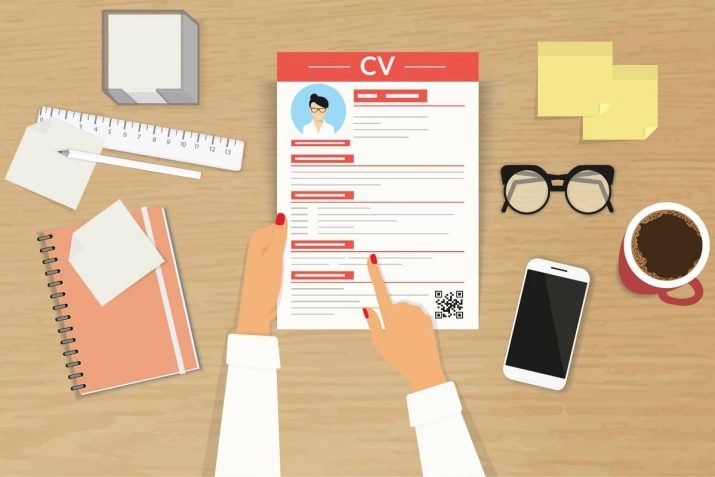
Let's consider in detail several main blocks of the resume.
Personal qualities
It should be noted at once that the personal qualities of the doctor are quite important. Of course, the most important part of your resume should be a description of your medical education, as well as work experience in the specialty, however, the section "Personal qualities" should never be neglected. The thing is that a doctor spends quite a lot of time during his working day surrounded by people: patients or colleagues (even the veterinarian communicates with the owners of the animals). This is why your personality matters a lot in terms of whether you will be hired or not.
It is useful for a doctor to have such qualities as resistance to stress, communication skills, customer focus, patience, love for people, tolerance, discipline, responsibility, a sense of duty, etc. However, in no case should you copy templates from the Internet, describe your personality and approach the task with creativity.
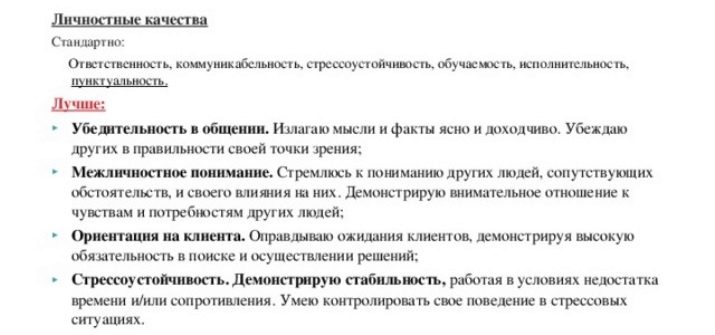
Professional skills and abilities
Professional skills and abilities - it is the foundation of you as a specialist. Be sure to tell them that you are able to work with data files (both physical and computer), that you are able to conduct diagnostic studies, that you are proficient in psychological methods of communicating with patients, etc.
The more skills and abilities you have, the more attention the employer will pay to you. In order not to be unfounded, you can also attach copies of certificates of completion of special courses or trainings. Remember that science and medicine are constantly evolving, so a specialist must keep up with all these changes and be aware of the latest technologies and developments.
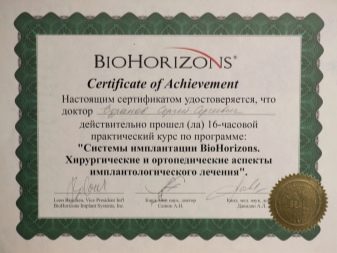

Interests and hobbies
Despite the fact that the profession of a doctor in itself is quite difficult and time-consuming, it is important to show the employer that you are an erudite and interested person, that there are other important things in your life besides work. For example, you can talk about your love for handicrafts, reading or watching documentaries. The section "Hobbies and hobbies" is a way to show your individuality and prove yourself as a highly educated and intelligent person.
If you have no work experience
It is especially difficult when applying for a job for those specialists who have just graduated from a higher educational institution and do not yet have the proper work experience. In this case, you will have to rely on 2 main points.
First of all, you need to tell about all your internships and practices that you took during your studies. You may have volunteered, provided health care to your neighbors, or helped a family member through educational activities. In this case, it will be especially important showcase reviews and recommendations.
The second thing that should be emphasized is your motivation. Be sure to talk about why you want to work as a doctor and why it is so important to you. The employer will definitely pay attention to such points.

Samples
Writing a resume can seem like a daunting task. This is why it is useful to have several visual examples on hand.
- Resume of a general practitioner.
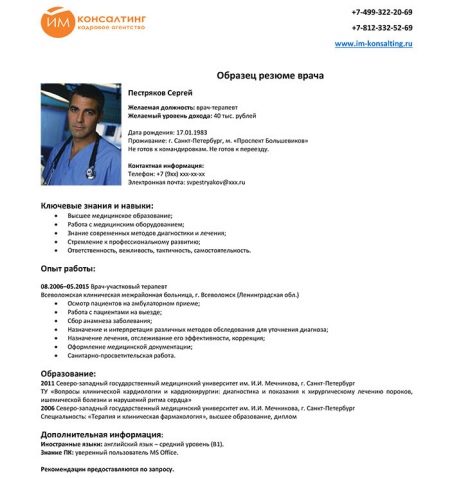
- Surgeon's resume.

- CV of a general practitioner.
